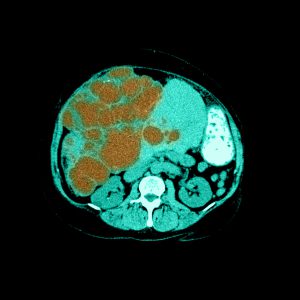Young Woman Faces Challenges of Polycystic Kidney Disease

Following a diagnosis of autosomal-dominant polycystic kidney disease (ADPKD), a 22-year-old recent college graduate was referred to Duke nephrologists by her primary care physician. To the accomplished young woman who had earned a competitive national scholarship for college, the diagnosis and prospect of long-term dialysis was daunting and discouraging.
Questions: What recommendations did the nephrologists make regarding her treatment? What steps were taken to offer reassurance about her long-term health and longevity?
Under the guidance of a coordinated care team, the patient recovered with excellent outcomes. She began to focus again on her goals of academic achievement: She was recently accepted into a graduate program at an Ivy League university.
Because she concentrated on her care and was adherent to treatments, the young woman was considered an excellent candidate for transplant.
“This is a good example of a young, motivated patient who demonstrated a commitment to overcoming a challenging genetic condition,” says Eugene C. Kovalik, MD, a nephrologist who worked closely with the patient. “Just because you develop chronic kidney disease in your early 20s doesn’t mean your life has to be limited.”
Given the patient’s age, transplantation afforded the most appropriate long-term care option to help her reclaim a high quality of life and more normal longevity, Kovalik says.
Duke’s nephrology and transplantation teams helped turn a discouraging diagnosis into a positive medical and personal outcome, Kovalik says. The patient’s perspective made a difference as well, he noted.
“She brought a lot of personal energy and an upbeat attitude as she approached the treatment and eventual transplant,” Kovalik says. “For such a challenging diagnosis, she’s enjoyed a remarkable outcome.”